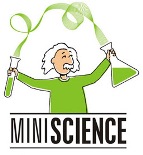
On this page:
See also:
- Our News and Media webpage for more Mini-Science 2010 stories and links.
Pseudoscience links for each Mini-Science 2010 talk
Pseudoscience is a methodology, belief, or practice that is claimed to be scientific, or that is made to appear to be scientific, but which does not adhere to an appropriate scientific methodology, lacks supporting evidence or plausibility, or otherwise lacks scientific status. For example, astronomy is a science, but astrology is generally viewed as a pseudoscience.
The term comes from the Greek prefix pseudo- (false or pretending) and "science" (from Latin scientia, meaning "knowledge").
Here are some links to articles about the pseudoscience topics that will be reviewed by the speakers at Mini-Science 2010.
April 7, "Science and the paranormal" by Joe Schwarcz.
Bending Spoons and Bending Minds:
Read an article on the McGill Science blog by "Dr Joe" about magicians and charlatans.
Homeopathy: Illusion, Delusion or Solution?:
Living in New York City can undoubtedly be stressful. So it is not too surprising that in many a pharmacy you’ll find “New York Stress Tabs.” The label describes the product as a “homeopathic lozenge designed to manage daily stresses related to sleep, work, relationships, travel, hangover, over-indulgence and pre-menstrual syndrome.” The instructions suggest that a lozenge be dissolved in the mouth and that the process be repeated hourly as needed. New York must indeed be a very stressful place. ... (An article on the McGill Science blog by "Dr Joe".)
The best psychic reader in the world?:
She’s rich. She’s famous. And she’s heartless. Who, but an unfeeling person, would tell the parents of a missing child, without any evidence, that their son is dead? Sylvia Browne, that’s who. “The best psychic reader in the world,” as she bills herself. Well, maybe not quite the best. ... (An article on the McGill Science blog by "Dr Joe".)
Montreal Paranormal Investigations:
In Montreal a loose-knit group of people investigate ghosts, hauntings and paranormal activities.
April 14, "What is the role of climate scientists in the climate change debate?" by Bruno Tremblay.
"Numbers or Chicken Bones: Responses to an Uncertain Environmental Future":
In 2009 Dr. Tremblay participated in this debate on the predictive power of environmental models.
Celsias:
This group was formed in March 2006 and helps people combat climate change. You can read articles about climate change, learn how to reduce your carbon footprint or ask questions at their website.
April 21, "The science and fad of hypnosis and other psychological phenomena" by Dr. Amir Raz.
Amir Raz: Waking up to potential of hypnosis
Read an article about Dr. Raz and his work as a psychologist who studies how the mind functions under hypnotic trance.
The Raz lab:
Information on Dr. Raz' publications and research.
April 28, "Vaccines; panaceas or poisons" by Dr. Brian Ward.
Dr. Ward's homepage at the Centre for Host-Parasite Interactions:
Dr. Ward has authored many studies on infectious diseases. Read more on his website.
Study that linked autism and vaccinations retracted:
Article published on Wednesday, February 3, 2010, in the Globe and Mail.
Vaccinations - Real and mythical events:
On-line presentation by Brian Ward, hosted on the website of the McGill University Center for Continuing Health Professional Education (CCHPE). In order to view the presentation, first you must register with the CCHPE. (Registration is free of charge.)
May 5, "Creationism, evolution, and God" by Dr. Brian Alters.
A threat to geoscience education: creationist anti-evolution activity in Canada:
Article by Dr. Jason Wiles, published September 1, 2006, in The Free Library.
McGill's Evolution Education Research Centre:
Learn about the centre's research and events.
May 12, "Homeopathy - dilution or delusion?" by Ariel Fenster.
Homeopathy:
Background history of the development and practice of homeopathy, from The Skeptics Dictionary.
May 19, "Are cell phones and WiFi harmful to your health?" by Lorne Trottier.
Electromagnetic field (EMF), electromagnetic radiation (EMR):
The Skeptic's Dictionary's definition of the electromagnetic field (EMF) and the realities of the dangers of EMFs produced by such things as power lines, electric appliances, radio waves, and microwaves. The article starts with a quote from Lorne Trottier and includes references for further reading:
A growing hysteria:
A 2009 feature article by Lorne Trottier on the hysteria over possible effects of electromagnetic fields (EMF) on health.
Analysis of Health and Environmental Effects of Proposed San Francisco Earthlink Wi-Fi Network (also available via an alternative link):
Article by Canadian scientist Magda Havas. Her research is frequently referenced to demonstrate the adverse biological impact of electromagnetic radiation. Her research focuses on the effects of radio frequency radiation (RFR) used by cell phones and other wireless technologies.
More pseudoscience links
The Richard Dawkins Foundation for Reason and Science:
Their website offers "scientific, rationalist and humanist information and materials".
There are many organizations for skeptics. The Skeptics Society is a US-based scientific and educational organization of scholars, scientists, historians, magicians, professors and teachers. Their website serves as an educational tool for those seeking clarification and viewpoints on Pseudoscience ideas and claims. Locally, the Montreal Skeptics Meetup is a forum for critical, scientific and skeptical inquirers, exploring a broad range of issues including paranormal claims, parapsychology, complementary and alternative medicine, fringe science and borderland science claims, as well as how to communicate scientific inquiry to the public. The Montreal Skeptics Meetup is hosted by the new Centre for Inquiry Montreal (CFI), which is an independent organization affiliated with les Sceptiques du Québec.
General links
Here are some links to websites and electronic resources for Mini-Science participants.
McGill Science homepage and blog
The McGill Alumni Online Community
Science Outreach at McGill broadcasts our scientific expertise to a wider community through programs and activities such as talks, lab visits, family workshops, classroom presentations, and documentary films.
Library links
The Libraries homepage includes links to all library resources at McGill.
Branch libraries of particular interest to Mini-Science include: